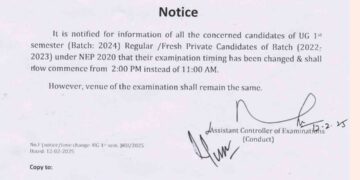SRINAGAR: In a significant step forward for cancer diagnosis, the Multidisciplinary Centre for Advanced Research and Studies (MCARS) at Jamia Millia Islamia (JMI) has launched the world’s first Artificial Intelligence (AI)-powered Oral Cancer Database.
This pioneering achievement has the potential to significantly increase the accuracy and efficiency of identifying oral submucous fibrosis (OSMF) and oral squamous cell carcinoma (OSCC), two frequent types of oral cancer.Miss Nisha Chaudhary, a PhD student, led the innovative effort under Dr Tanveer Ahmad’s competent supervision.
Their findings, which will be published in Scientific Data, a division of the respected Nature Publishing Group, represent a significant leap in the disciplines of AI and digital pathology.
At the centre of this invention is the ORCHID (Oral Cancer Histology Image Database) collection, which was painstakingly constructed from over 300,000 high-resolution tissue photos, with over one million images inspected.
The dataset was created using samples collected from prestigious medical institutions across India, such as the Ranchi Institute of Medical Sciences in Jharkhand, the All India Institute of Medical Sciences (AIIMS), the Maulana Azad Institute of Dental Sciences in New Delhi, and Banaras Hindu University in Uttar Pradesh.
Each of these institutes contributed under the supervision of top experts such as Dr Arpita Rai, Dr Deepika Mishra, Dr Augustine, and Dr Akhilesh Kumar.This artificial intelligence application is intended to detect and monitor the progression of oral cancer using digital photographs, providing an important resource for timely detection, particularly in areas with inadequate pathology resources.
The ORCHID dataset has already sparked global interest, with researchers all over the world eager to gain access to this cutting-edge resource and the programming codes that enable the AI diagnostic tool. “Our dataset is a significant step towards making early diagnosis of oral cancer faster, more accurate, and accessible to everyone, especially in regions with limited pathology resources,” Nisha Chaudhary, the researcher, added.
Dr Tanveer Ahmad, the study’s senior author, underlined the significance of this finding, citing the extraordinary international attention in their work.This is the world’s first large-scale database, and the response has been enormous.
Researchers from around the world are demanding access to our database and AI tool to further their own studies in digital pathology.Dr. Akhilanand Chaurasia, MDS Oral Medicine and Radiology, KGMU, and another senior author of the study, emphasised the transformative nature of this achievement.
“AI and digital pathology have already altered the realm of oral cancer detection, and our team’s database will have a transformational influence on patients worldwide. We are delighted that India was the first country in the world to establish such a comprehensive database, which contains high-resolution photos, ensuring the best level of accuracy for the AI training and diagnosis tool.
“The work, titled High-resolution AI picture dataset for identifying oral submucous fibrosis and squamous cell carcinoma, marks a significant step forward in the integration of AI into regular clinical diagnostics, especially in resource-limited situations where fast detection is important.
Professor Mohammad Husain, Director of MCARS at JMI, commended all of the study’s authors and expressed delight in their efforts.
“This AI database will be useful for researchers across the globe, and we are proud that our researchers at MCARS, JMI have been the first to develop such a database and AI-based diagnostic tool.”With the successful establishment of an AI-driven oral cancer database, JMI has set a new benchmark in cancer diagnostics, paving the way for further research and innovation in the ongoing fight against oral cancer.
The ORCHID dataset is not only a significant achievement for India, but it also stands as a beacon of hope for the advancement of cancer diagnoses globally.











































